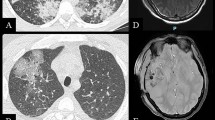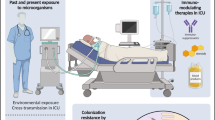Abstract
Background
Infectious complications are significant causes of morbidity and mortality after allogeneic hematopoietic cell transplantation (allo-HCT). They occur variably over different periods, with scant data reported from Lebanon and neighboring countries. In this study, we described the pre-engraftment neutropenic phase, febrile episodes, and peri-transplant medical complications in patients undergoing allo-HCT at a tertiary-care hospital.
Methods
This is a retrospective chart review of patients who underwent allo-HCT between 2007 and 2016 at Makassed General Hospital in Beirut, Lebanon. Data were extracted from medical records, the HCT registry, and medical laboratory logbooks.
Results
One hundred and six patients were included, 75% having hematologic malignancies and 13% aplastic anemia. None received antibacterial prophylaxis with fluoroquinolones. Yet from conditioning chemotherapy till the say before HCT, 32% of the patients received broad-spectrum antibiotics (BSA) due to fever or infection. At the day of cell infusion, 41.5% of the patients were on BSA. Neutrophil engraftment failure was recorded in 8% of the patients. The cumulative incidence of pre-engraftment bacteremia and Gram-negative bacteremia was 14.3 and 7.1%, respectively. Aplastic anemia was an independent risk factor for pre-engraftment bacteremia [hazard ratio (HR) = 3.86, 95% confidence interval (CI) (1.29–11.5), P = 0.02]. The cumulative incidence of pre-engraftment pneumonia was 11.2%. Patient age significantly increased the risk of pre-engraftment pneumonia [HR = 12.35, 95% CI (1.27–120.50), P = 0.03]. Six-month post-transplant mortality reached 17% in our cohort. Myelodysplastic syndrome was the only significant parameter increasing the risk of death [HR = 3.40, 95% CI (1.05–10.98), P = 0.04].
Conclusion
The cumulative incidence of pre-engraftment bacteremia and pneumonia was 14.3% and 11.2% respectively in this cohort. Aplastic anemia predicted for the occurrence of bacteremia, increasing patient age contributed to the occurrence of pneumonia, and myelodysplastic syndrome increased the risk of death.





Similar content being viewed by others
References
Omrani AS, Almaghrabi RS. Complications of hematopoietic stem cell transplantation: bacterial infections. Hematol Oncol Stem Cell Ther. 2017;10:228–32.
Gea-Banacloche J. Risks and epidemiology of infections after hematopoietic stem cell transplantation. Cham: Springer; 2016. p. 81–99.
Blennow O, Ljungman P, Sparrelid E, et al. Incidence, risk factors, and outcome of bloodstream infections during the pre-engraftment phase in 521 allogeneic hematopoietic stem cell transplantations. Transpl Infect Dis. 2014;16:106–14.
Kikuchi M, Akahoshi Y, Nakano H, et al. Risk factors for pre- and post-engraftment bloodstream infections after allogeneic hematopoietic stem cell transplantation. Transpl Infect Dis. 2015;17:56–655.
Mikulska M, Raiola AM, Galaverna F, et al. Pre-engraftment bloodstream infections after allogeneic hematopoietic cell transplantation: impact of T cell-replete transplantation from a haploidentical donor. Biol Blood Marrow Transplant. 2018;24:109–18.
Aguilar-Guisado M, Jimenez-Jambrina M, Espigado I, et al. Pneumonia in allogeneic stem cell transplantation recipients: a multicenter prospective study. Clin Transplant. 2011;25:E629–E638638.
Bazarbachi A, et al. Trends in hematopoietic stem cell transplant activity in Lebanon. Hematol Oncol Stem Cell Ther. 2017;10:315–20.
Moghnieh R, Abdallah D, Awad L, et al. Bacteraemia post-autologous haematopoietic stem cell transplantation in the absence of antibacterial prophylaxis: a decade’s experience from Lebanon. Infection. 2018;46:823–35.
Moghnieh R, Estaitieh N, Mugharbil A, et al. Third generation cephalosporin resistant Enterobacteriaceae and multidrug resistant Gram-negative bacteria causing bacteremia in febrile neutropenia adult cancer patients in Lebanon, broad spectrum antibiotics use as a major risk factor, and correlation with poor prognosis. Front Cell Infect Microbiol. 2015;5:11. https://doi.org/10.3389/fcimb.2015.00011.
Stone R, Fliedner MC, Smiet AC. Management of oral mucositis in patients with cancer. Eur J Oncol Nurs. 2005;9:S24–32.
Nassereddine S, Rafei H, Elbahesh E, et al. Acute graft versus host disease: a comprehensive review. Anticancer Res. 2017;37:1547–55.
Freifeld AG, Bow EJ, Sepkowitz KA, et al. Clinical practice guideline for the use of antimicrobial agents in neutropenic patients with cancer: 2010 update by the Infectious Diseases Society of America. Clin Infect Dis. 2011;52:e56–93.
Murray S. Engraftment. In: Maziarz R, Slater S, editors. Blood and marrow transplant handbook. Cham: Springer; 2015.
Tomblyn M, Chiller T, Einsele H, et al. Guidelines for preventing infectious complications among hematopoietic cell transplantation recipients: a global perspective. Biol Blood Marrow Transplant. 2009;15:1143–238.
Hughes WT, Armstrong D, Bodey GP, et al. 2002 Guidelines for the use of antimicrobial agents in neutropenic patients with cancer. Clin Infect Dis. 2002;34:730–51.
Kanafani ZA, Dakdouki GK, El-Chammas KI, et al. Bloodstream infections in febrile neutropenic patients at a tertiary care center in Lebanon: a view of the past decade. Int J Infect Dis. 2007;11:450–3.
Araj GF, Avedissian AZ, Ayyash NS. A reflection on bacterial resistance to antimicrobial agents at a major tertiary care center in Lebanon over a decade. J Med Liban. 2012;103:1–11.
Chamoun K, Farah M, Araj G, et al. Surveillance of antimicrobial resistance in Lebanese hospitals: retrospective nationwide compiled data. Int J Infect Dis. 2016;46:64–70.
Centers for Disease Control and Prevention. Bloodstream infection event (central line-associated bloodstream infection and non-central line-associated bloodstream infection). National healthcare safety network (NHSN) patient safety component manual. 2017. https://www.cdc.gov/nhsn/pdfs/pscmanual/pcsmanual_current.pdf. Accessed 30 Nov 2017.
CLSI. Performance standards for antimicrobial susceptibility testing; twenty-seventh informational supplement. CLSI document M100-S27. Clinical and Laboratory Standards Institute, Wayne, PA. 2017.
American Thoracic Society (ATS), Infectious Diseases Society of America (IDSA). Guidelines for the management of adults with hospital-acquired, ventilator-associated, and healthcare-associated pneumonia. Am J Respir Crit Care Med. 2005;171:388–416.
Kalil AC, Metersky ML, Klompas M, et al. Management of adults with hospital-acquired and ventilator-associated pneumonia: 2016 clinical practice guidelines by the Infectious Diseases Society of America and the American Thoracic Society. Clin Infect Dis. 2016;63:e61–e111.
Saitama Medical Center, Jichi Medical University. Free Statistical Software EZR. https://www.jichi.ac.jp/saitama-sct/SaitamaHP.files/statmedEN.html (2019). Accessed 16 Oct 2019.
Kanda Y. Investigation of the freely available easy-to-use software ‘EZR’ for medical statistics. Bone Marrow Transplant. 2013;48:452–8.
Patriarca F, Cigana C, Massimo D, et al. Risk factors and outcomes of infections by multidrug-resistant Gram-negative bacteria in patients undergoing hematopoietic stem cell transplantation. Biol Blood Marrow Transplant. 2017;23:333–9.
Schuster MG, Cleveland AA, Dubberke ER et al. Infections in hematopoietic cell transplant recipients: results from the organ transplant infection project, a multicenter, prospective, cohort study. In: Open forum infectious diseases. 2017 (vol 4, p ofx050). Oxford University Press, Oxford.
Forcina A, Lorentino F, Marasco V, et al. Clinical impact of pretransplant multidrug-resistant Gram-negative colonization in autologous and allogeneic hematopoietic stem cell transplantation. Biol Blood Marrow Transplant. 2018;24:1476–82.
Ferreira AM, Moreira F, Guimaraes T, et al. Epidemiology, risk factors and outcomes of multi-drug-resistant bloodstream infections in haematopoietic stem cell transplant recipients: importance of previous gut colonization. J Hosp Infect. 2018;100:83–91.
Martin-Pena A, Aguilar-Guisado M, Espigado I, et al. Prospective study of infectious complications in allogeneic hematopoietic stem cell transplant recipients. Clin Transplant. 2011;25:468–74.
Kim SH, Kee SY, Lee DG, et al. Infectious complications following allogeneic stem cell transplantation: reduced-intensity vs. myeloablative conditioning regimens. Transpl Infect Dis. 2013;15:49–59.
Ustun C, Young JA, Papanicolaou GA, et al. Bacterial blood stream infections (BSIs), particularly post-engraftment BSIs, are associated with increased mortality after allogeneic hematopoietic cell transplantation. Bone Marrow Transplant. 2019;54:1254–65.
Misch EA, Andes DR. Bacterial infections in the stem cell transplant recipient and hematologic malignancy patient. Infect Dis Clin N Am. 2019;33:399–445.
Girmenia C, Bertaina A, Piciocchi A, et al. Incidence, risk factors and outcome of pre-engraftment Gram-negative bacteremia after allogeneic and autologous hematopoietic stem cell transplantation: an Italian prospective multicenter survey. Clin Infect Dis. 2017;65:1884–966.
Chen Y, Huang XJ, Wang FR, et al. Etiological analysis of fever in the first 24 hours following allogeneic peripheral stem cell transfusion. Zhonghua Nei Ke Za Zhi. 2012;51:179–83.
McCurdy SR, Muth ST, Tsai HL, et al. Early fever after haploidentical bone marrow transplantation correlates with class II HLA-mismatching and myeloablation but not outcomes. Biol Blood Marrow Transplant. 2018;24:2056–64.
Gudiol C, Garcia-Vidal C, Arnan M, et al. Etiology, clinical features and outcomes of pre-engraftment and post-engraftment bloodstream infection in hematopoietic SCT recipients. Bone Marrow Transplant. 2014;49:824–30.
Becker K, Heilmann C, Peters G. Coagulase-negative staphylococci. Clin Micrbiol Rev. 2014;27:870–926.
May L, Klein EY, Rothman RE, et al. Trends in antibiotic resistance in coagulase-negative staphylococci in the United States, 1999 to 2012. Antimicrob Agents Chemother. 2014;58:1404–9.
Chong Y, Yakushiji H, Ito Y, Kamimura T. Clinical impact of fluoroquinolone prophylaxis in neutropenic patients with hematological malignancies. Int J Infect Dis. 2011;15:e277–e281281.
Mikulska M, Averbuch D, Tissot F, et al. Fluoroquinolone prophylaxis in haematological cancer patients with neutropenia: ECIL critical appraisal of previous guidelines. J Infect. 2018;76:20–37.
Moghnieh RA, Kanafani ZA, Tabaja HZ, et al. Epidemiology of common resistant bacterial pathogens in the countries of the Arab League. Lancet Infect Dis. 2018;18:e379–e394394.
Moghnieh R, Araj GF, Awad L, et al. A compilation of antimicrobial susceptibility data from a network of 13 Lebanese hospitals reflecting the national situation during 2015–2016. Antimicrob Resist Infect Control. 2019;8:41. https://doi.org/10.1186/s13756-019-0487-5.
Gafter-Gvili A, Fraser A, Paul M, et al. Antibiotic prophylaxis for bacterial infections in afebrile neutropenic patients following chemotherapy. Cochrane Database Syst Rev. 2012;1:CD004386.
Harris B, Morjaria SM, Littmann ER, et al. Gut microbiota predict pulmonary infiltrates after allogeneic hematopoietic cell transplantation. Am J Resp Crit Care Med. 2016;194:450–63.
Weber D, Jenq RR, Peled JU, et al. Microbiota disruption induced by early use of broad-spectrum antibiotics is an independent risk factor of outcome after allogeneic stem cell transplantation. Biol Blood Marrow Transplant. 2017;23:845–52.
Taur Y, Jenq RR, Perales MA, et al. The effects of intestinal tract bacterial diversity on mortality following allogeneic hematopoietic stem cell transplantation. Blood. 2014;124:1174–82.
Shono Y, van den Brink MR. Empiric antibiotic use in allogeneic hematopoietic cell transplantation: should we avoid anaerobe coverage? Blood Adv. 2017;1:2325–8.
Acknowledgements
None.
Funding
None.
Author information
Authors and Affiliations
Corresponding author
Ethics declarations
Conflict of interest
The authors declare that they have no conflict of interests.
Electronic supplementary material
Below is the link to the electronic supplementary material.
Rights and permissions
About this article
Cite this article
Moghnieh, R., Tamim, H., Abyad, A. et al. Pre-engraftment infectious complications and patient outcomes after allogeneic hematopoietic cell transplantation: a single-center experience from Lebanon. Infection 48, 385–401 (2020). https://doi.org/10.1007/s15010-020-01407-6
Received:
Accepted:
Published:
Issue Date:
DOI: https://doi.org/10.1007/s15010-020-01407-6




